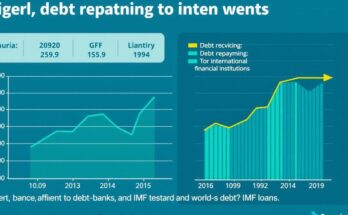Wall Street has seen a significant decline, eliminating all gains since the Election Day for the S&P 500. Heightened trade tensions and new tariffs have raised concerns about the economic impact. Major retailers are warning of profit pressures, particularly due to tariffs imposed by the U.S. on imports from Canada, Mexico, and China, contributing to a negative sentiment in the markets.
On Wall Street, stocks experienced significant losses once again, erasing all gains achieved since Election Day for the S&P 500 index. The decline is attributed to heightened tensions in the trade war between the United States and its major trading partners, with newly imposed tariffs and retaliatory measures contributing to investor concerns about a potential global economic slowdown.
The Trump administration enacted tariffs on imports from Canada and Mexico as of Tuesday, while doubling tariffs on goods from China. Consequently, the S&P 500 index fell by 1.2%, with over 80% of its components recording losses. The Dow Jones Industrial Average did not fare better, slipping 1.6%, and the Nasdaq composite dropped 0.4% despite some gains in prominent tech stocks such as Nvidia and Microsoft.
The financial sector faced substantial pressure, with notable declines in major institutions like JPMorgan Chase and Bank of America, which fell by 4% and 6.3%, respectively. European markets also reflected the negative sentiment, with Germany’s DAX index declining by 3.5% due to losses among automakers. Meanwhile, Asian stocks experienced only modest drops.
Investment strategy analyst Ross Mayfield expressed that the market’s ability to predict the implications of the ongoing trade war remains challenging, indicating that the current circumstances present a more severe situation compared to previous periods during Trump’s administration. Moreover, upcoming communications from President Trump regarding tariff discussions have heightened market volatility.
The recent stock market downturn has effectively washed away the gains made since Trump’s election in November, which were fueled by optimistic expectations regarding policies intended to bolster the U.S. economy. Concerns regarding rising consumer prices and inflation due to tariffs have increasingly weighed on investor sentiment.
Retailers are beginning to issue warnings about potential impacts on profitability due to tariffs. For instance, Target’s shares dropped 3% despite exceeding earnings projections, citing “meaningful pressure” on profits from tariffs. Additionally, Best Buy experienced a stark decline of 13.3%, the largest drop among S&P 500 stocks, after providing an earnings forecast that disappointed investors.
Best Buy’s CEO Corie Barry highlighted the importance of international trade, stating that both China and Mexico are pivotal suppliers for the company’s products. The current tariffs impose 25% taxes on imports from Canada and Mexico, with a 10% import duty on Canadian energy products now also applied. The previous 10% tariff on Chinese imports has doubled to 20%.
Retaliatory measures have been promptly implemented, with China announcing further tariffs of up to 15% on U.S. agricultural exports, such as chicken and pork. Canada plans to impose tariffs amounting to over $100 billion on American goods. This evolving tariff landscape poses significant challenges for U.S. companies, which are nearing the conclusion of their latest quarterly financial reports and have projected reduced earnings growth for the current quarter.
Economic reports signal growing consumer pessimism regarding inflation, coupled with reduced spending, which poses risks for the U.S. economy. Investors were hoping for continuous interest rate reductions by the Federal Reserve; however, recent monetary policy indicates a more cautious approach due to tariff uncertainties.
In the bond market, Treasury yields exhibited mixed performance, with the yield on the 10-year Treasury rising to 4.20%. Concerns regarding the sustainability of U.S. economic strength have contributed to fluctuations in bond values. Sam Stovall, the chief investment strategist at CFRA, noted that tariffs are influencing market dynamics, leading to fears of increased inflation, which could impact bond market stability.
Ultimately, the S&P 500 experienced a significant decline of 71.57 points, closing at 5,778.15, while the Dow fell 670 points to 42,520.99 and the Nasdaq decreased by 65.03 points to 18,285.16.
In summary, Wall Street’s recent downturn has erased all gains from Election Day for the S&P 500, primarily due to escalating trade tensions and new tariffs impacting key trading partners. Retailers are expressing concerns regarding profitability, while widespread losses in stocks highlight investor anxieties about potential economic slowdowns. The Federal Reserve’s cautious stance amid inflation concerns further complicates the economic outlook for investors.
Original Source: www.newsday.com




